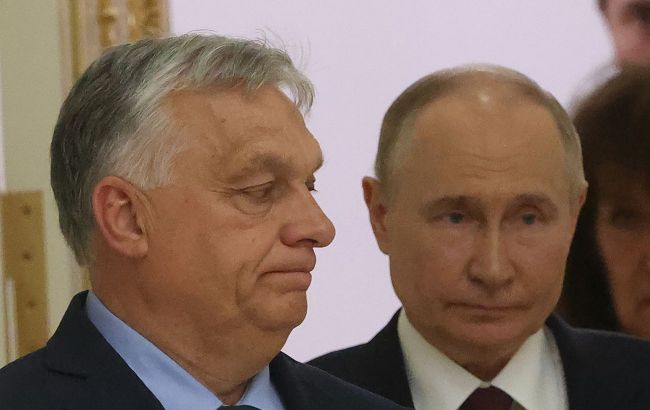Ukraine targets Druzhba pipeline: How attacks hit Russia and why Orbán is worried
 Russian President Vladimir Putin and Hungarian Prime Minister Viktor Orbán (photo: Getty Images)
Russian President Vladimir Putin and Hungarian Prime Minister Viktor Orbán (photo: Getty Images)
Ukraine has begun almost regular attacks not only on Russian refineries but also on oil export infrastructure - the Druzhba pipeline. Read what goals Kyiv is pursuing and how Hungary, the importer of Russian oil, is responding to the strikes on Druzhba.
Over the past two weeks, Ukraine has already attacked the Druzhba pipeline infrastructure on Russian territory three times. After each attack, the transit of Russian oil through Ukraine to Hungary was halted.
The first strikes on Druzhba were carried out at the beginning of the second decade of August. On August 13, a transformer was damaged at the Unecha distribution station in the Bryansk region. Its repair took several days, and the transit of oil through Ukraine to Hungary was not significantly affected, as deliveries had been stopped at that time due to scheduled maintenance. Pumping of oil resumed on August 15.
Hungary’s Foreign Minister, Péter Szijjártó, called the strikes on Druzhba an attempt on his country’s energy security.
A few days later, the attacks repeated. On August 17, the Nikolskoye pumping station in the Tambov region was attacked, causing a halt in oil transit. The repair work was carried out in a few days, and on August 20, the pipeline resumed operation, but not for long.
On August 22, the facility was attacked again on Russian territory. The supply of oil for transit to Hungary was halted once again. Szijjártó called the strikes on Druzhba attempts to drag Hungary into the war and indicated that Budapest could respond by halting energy supplies to Ukraine.
RBC-Ukraine has already reported that such a move from Hungary is unlikely. Similar threats have been made repeatedly in the past. However, if Budapest does decide to block electricity supplies, imports could be increased through other channels - via Poland and Romania. The import capacities of neighboring countries are not being used to their full extent.
Additionally, Hungarian Prime Minister Viktor Orbán even complained about Ukraine’s attacks to Donald Trump, who, according to Orbán, was allegedly "very angry" over Ukraine’s actions. According to Hungarian media, the US President reportedly wrote his reaction with a marker on Orbán’s letter in response. There is no other confirmation of Trump’s reaction. On the other hand, it is known that on August 18, the US President called the Hungarian Prime Minister and asked him to stop blocking Ukraine’s EU accession talks.
Why oil transit continues
Ukraine has not stopped the transit of Russian oil, even though it provides Russia with nearly $6 billion in revenue annually.
The idea of cutting off transit has arisen in Ukraine multiple times since 2022. The issue has resurfaced almost every time Hungary blocked EU sanctions on Russia or slowed Ukraine’s European integration process.
However, Kyiv has never risked turning off the tap, even though the EU Association Agreement (Article 472) allows this on security grounds during wartime. There was a small pause in 2022 due to payment issues caused by sanctions on Russia, but the problems were resolved and transit resumed.
The main reason transit has continued throughout the war is the risk of retaliatory penalties for breaching the transit contract, which is valid until 2030. In addition, Ukraine itself imports small volumes of oil products produced at Hungarian refineries from Russian oil.
Hungary, for its part, has not planned to give up Russian oil, even though the EU imposed a ban on its import by land and sea in 2022. At that time, exceptions were made for Hungary, Czechia, and Slovakia under the 6th sanctions package. They were temporarily allowed to purchase Russian oil via transit through Ukraine until they found alternative routes. In other words, the exemption period was unlimited. Czechia and partially Slovakia resolved the issue, while Hungary did not even attempt to do so.
Mykhailo Honchar, president of the Center for Global Studies Strategy XXI, believes that Budapest deliberately did not seek alternatives, hoping for the indefinite nature of the exemptions. "The fact that Hungary did nothing is its problem. They could have fully replaced Russian oil with supplies via the Adriatic Sea," he said in a comment to RBC-Ukraine.
The strike is less about Hungary and more about Russian oil exports
Ukrainian President Volodymyr Zelenskyy recently confirmed that the strikes on the Druzhba pipeline are essentially a response to Hungary’s blockade of Ukraine’s EU integration process. "We have always supported friendship between Ukraine and Hungary, but now the existence of Druzhba depends on Hungary," Zelenskyy said.
However, Honchar believes that the attacks on Druzhba are not so much a response to the problems Budapest creates for Ukraine regarding EU integration, but rather a strike on Russia’s energy sector itself.
"This issue is less about influencing Hungary and more about striking the strategic oil transport infrastructure of the aggressor, primarily its oil exports," he told RBC-Ukraine.
The Unecha station is the largest and most important hub in Russia’s oil transportation system. Through it, oil is sent to the Ust-Luga port, which handles up to 20% of Russia’s oil exports. Deliveries are also made to the Mozyr refinery in Belarus.
Thus, considering the strikes on Russian refineries, the cumulative negative effect on Russia is increasingly felt.
Ukrainian intelligence reports a fuel crisis in Russia. Due to gasoline shortages in some regions, it is already being sold via rationing. Meanwhile, gasoline prices rose by 8% in August. Belarus is reducing deliveries of oil products to Russia because exporting them to other countries is more profitable. "It is more profitable for Belarus to send gasoline to China, India, and Africa, where a ton costs between 1,300 and 1,900 dollars, while in Russia, the price offered is under 1,000 dollars," the intelligence report says.
Vitalii Diachuk, analyst at the Central European Strategy Institute and the Re:Open Ukraine project, also believes that the main goal of the Druzhba strikes is not to pressure Hungary, but to weaken Russia. "The primary task, in my opinion, is still to reduce Russia’s capabilities. Any revenue from energy exports ultimately turns into missiles flying at Ukraine. And that is key. Everything else is secondary," Diachuk told RBC-Ukraine.
He added that Hungary and Slovakia themselves are to blame for not reducing their dependence on Russian energy. Regarding Trump’s reaction, the expert believes it is better not to focus on his markings on letters and wait for more official statements.
"I think the US is not interested in maintaining Russian oil transit, as they want to expand the market for their own energy resources to Europe, and Hungary’s position goes against US interests. Therefore, we should monitor the US’s next actions," Diachuk said.
According to EuroPravda, the European Commission, in response to Orbán’s complaint, stated that stopping oil transit through Ukraine does not affect the security of EU supplies. Thus, it is reasonable to assume that Ukraine’s attacks on Russian energy facilities may continue to maximize the potential to reduce Russia’s revenues used to fund its military aggression against Ukraine.

